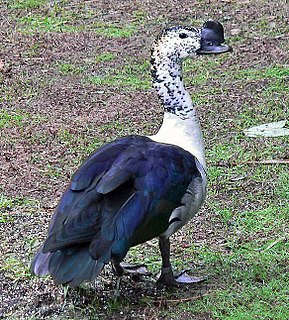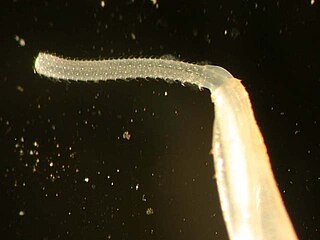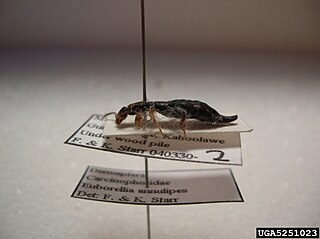| Myoleja | |
|---|---|
 | |
| Myoleja lucida | |
| Scientific classification | |
| Kingdom: | |
| Phylum: | |
| Class: | |
| Order: | |
| Section: | |
| Subsection: | |
| Superfamily: | |
| Family: | |
| Genus: | Myoleja |
Myoleja is a genus of tephritid or fruit flies in the family Tephritidae. [1] [2] [3]
| Myoleja | |
|---|---|
 | |
| Myoleja lucida | |
| Scientific classification | |
| Kingdom: | |
| Phylum: | |
| Class: | |
| Order: | |
| Section: | |
| Subsection: | |
| Superfamily: | |
| Family: | |
| Genus: | Myoleja |
Myoleja is a genus of tephritid or fruit flies in the family Tephritidae. [1] [2] [3]
The genus contains the following species: [1]

Sarkidiornis is sometimes considered a monotypic genus with its sole member the knob-billed duck, a cosmopolitan species. Most taxonomic authorities, however, split the species into two:

Palaeacanthocephala is a class within the phylum Acanthocephala. The adults of these parasitic platyzoans feed mainly on fish, aquatic birds and mammals. This order is characterized by the presence of lateral longitudinal lacunar canals and a double-walled proboscis receptacle. The nuclei of the hypodermis are fragmented and the males have two to seven cement glands, unlike their relatives the Archiacanthocephala which always have eight.

Epomophorus is a genus of bat in the family Pteropodidae. They have a distribution throughout Africa.

Anisolabididae is a family of earwigs, in the suborder Forficulina and the order Dermaptera. It is one of nine families in the suborder Forficulina, and contains thirty-eight genera spread across thirteen subfamilies.
Rhagoletis turanica is a species of tephritid or fruit fly in the genus Rhagoletis of the family Tephritidae.
Rhagoletis willinki is a species of tephritid or fruit fly in the genus Rhagoletis of the family Tephritidae.

Rhagoletis zephyria is a species of tephritid or fruit fly in the genus Rhagoletis of the family Tephritidae.
Rhagoletis zoqui is a species of tephritid or fruit fly in the genus Rhagoletis of the family Tephritidae.
Rhagoletis tomatis is a species of tephritid or fruit fly in the genus Rhagoletis of the family Tephritidae.
Bathylagus is a genus of deep-sea smelts, some species of which are noted for having stylophthalmine larvae.

The Hemiphractidae are a family of frogs from South and Central America. Previously, this group had been classified as a subfamily (Hemiphractinae) under family Hylidae. More recent research classifies these genera into their own family, or sometimes into three separate families: Amphignathodontidae, Cryptobatrachidae, and Hemiphractidae (Hemiphractus). An active question still exists as to which of these groupings is more accurate.
The New Ireland forest rat is a large rodent in the family Muridae. It is endemic to New Ireland, in the Bismarck Archipelago, Papua New Guinea.
Pseudoanthidium orientale is a species of bee in the genus Pseudoanthidium, of the family Megachilidae.
Lipotriches fervida is a species of bee in the genus Lipotriches, of the family Halictidae.
Lipotriches edirisinghei is a species of bee in the genus Lipotriches, of the family Halictidae.
Ceylalictus horni is a species of bee in the genus Ceylalictus, of the family Halictidae.
Lasioglossum serenum, also known as the Lasioglossum (Nesohalictus) serenum, is a species of bee in the genus Lasioglossum, of the family Halictidae.
Lasioglossum alphenum, also known as the Lasioglossum (Sudila) alphenum by Sakagami et al. (1996), is a species of bee in the genus Lasioglossum, of the family Halictidae.
Anthidiellum krombeini is a species of leaf-cutting bee in the genus Anthidiellum, of the family Megachilidae.

Notiosoricini, whose members are known as the North American gray shrews, is a tribe of shrews in the family Soricidae, including the genera Megasorex and Notiosorex. They are found across the southwestern United States and most of Mexico.
| This Trypetinae-related article is a stub. You can help Wikipedia by expanding it. |